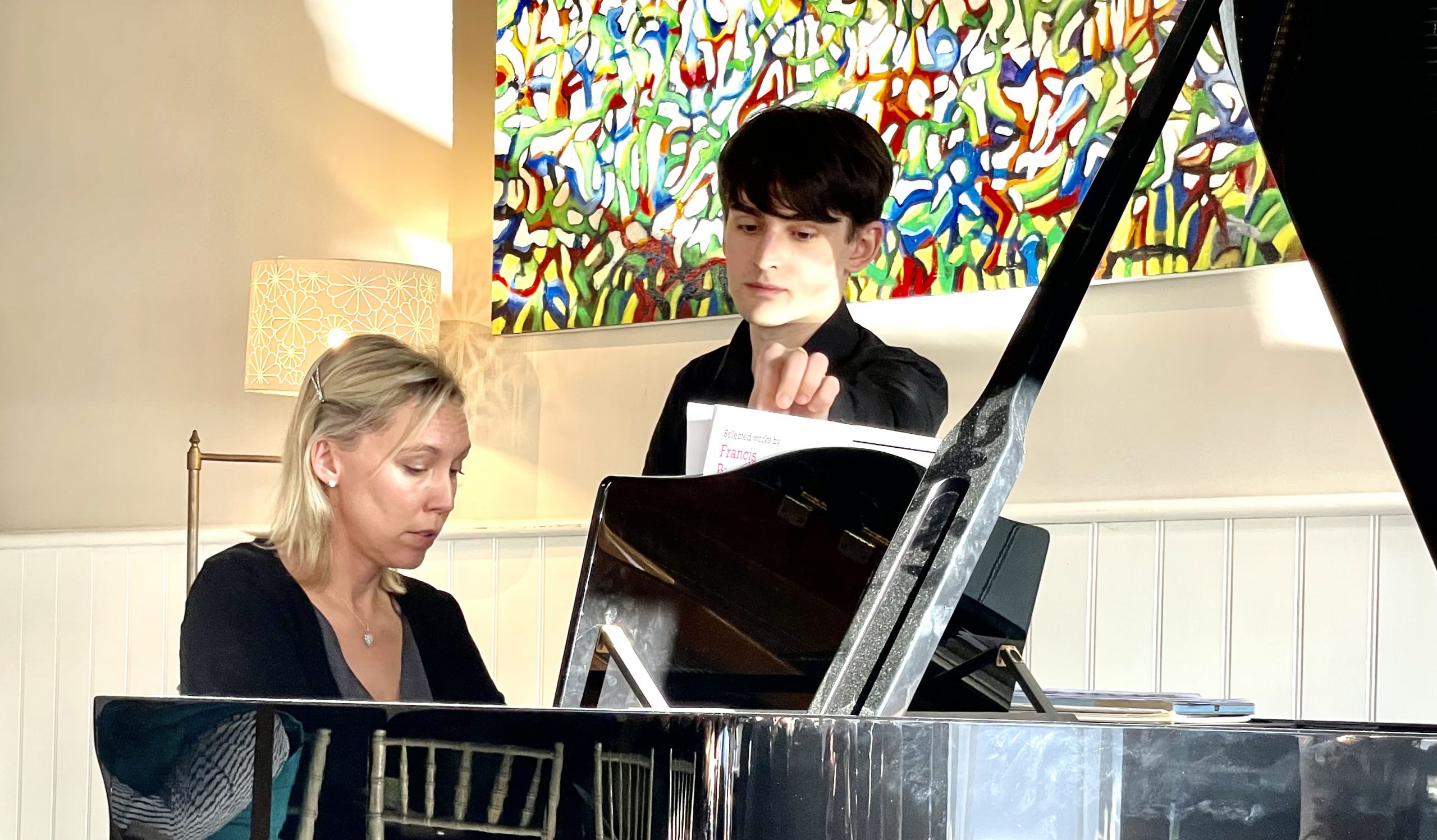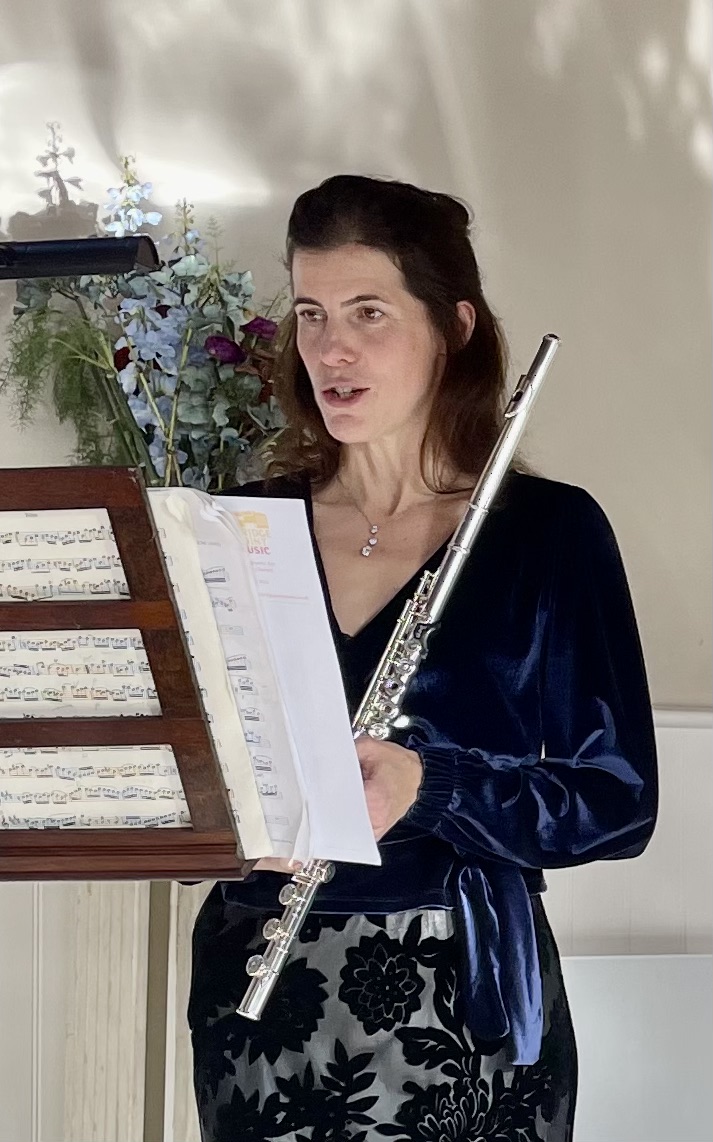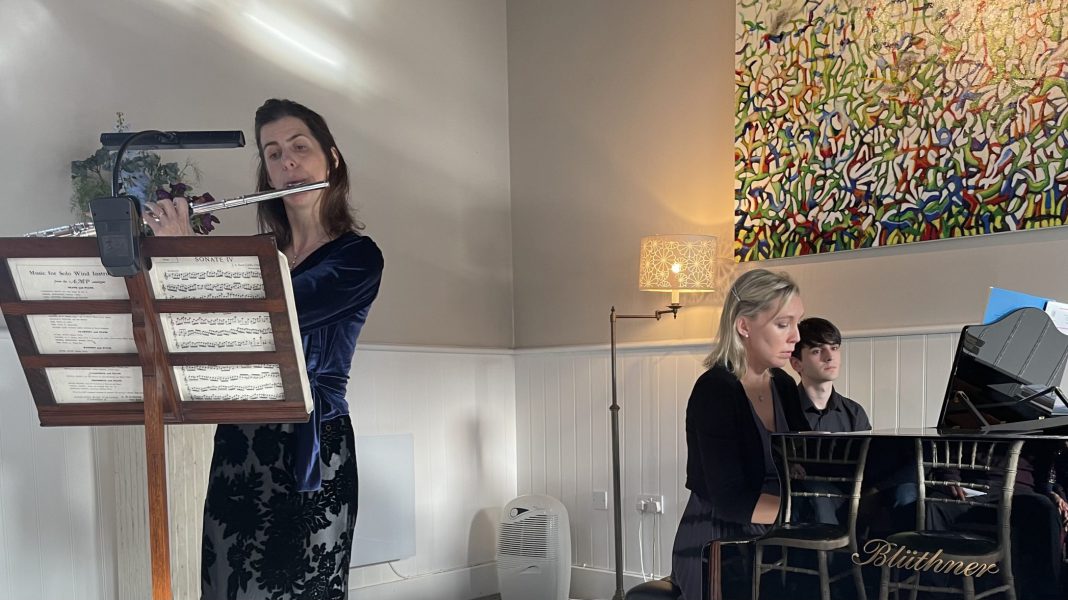This is the first of a series of reviews of Bridgepoint Music concerts written by the singer Rebekah Gilbert whom many will know as Rye’s former mayor and current mayoress. Readers may not know about her singing degree from the Royal Academy of Music, or that she has performed extensively as a classical soloist in London’s leading concert halls and has recorded for Classic FM, EMI, the BBC and Abbey Road Studios.
After early morning rain, the leaves glistened in the autumnal sunshine as we arrived at Fairlight Hall to hear a wonderful pairing of local professional musicians at the now well-established concert series produced by Bridgepoint Music.
Katherine Barker, principal flute of the orchestra at the Royal Opera House is a graduate of the Royal Academy of Music, having studied with the great William Bennett. She was previously principal flute at the Halle and BBC National Orchestra of Wales, as well as guesting with many of the country’s most eminent orchestras. She has performed as a soloist and chamber musician, and is a professor at her alma mater.
Pianist Anne Marshall is a dear friend and wonderfully versatile musician whom I have had the privilege of working with on many and varied occasions, from Bach to Bond. She has accompanied Sir James Galway, as well as most of the world’s leading flautists. She has also performed as a concert soloist with many orchestras around the globe, including her country of birth, South Africa, where she originally studied. Taking her post graduate diploma at the Royal College of Music, she teaches both privately and at Benenden School.
The duo gave us a well-balanced and complementary programme. Opening with JS Bach’s Sonata for Flute in E minor, one instantly recognised Anne’s sympathetic accompaniment without pedal to reflect the harpsicord continuo. The meticulous mathematical accuracy of the allegro was synergistic to the nth degree between players, and the pianissimo’s of the andante were contrasted by the concluding bold allegro.

Poulenc’s sonata is instantly recognisable as a canonical piece for the flute, and is so evocative of the early twentieth centre French style. Anne introduced how it was composed, as “Jimmy” (Sir James) had once told her – with the last movement written whilst the composer sat in the Grand Metropol Hotel in Cannes and watched the pace of bell boys and the hustle and bustle of comings and goings as staff rushed around. Katherine’s superb technique meant that there was no shrillness or harshness at the top of the flute’s range, and her playing was reminiscent of the story.
There were contrasts of colour and lightness in her playing, which showed the instrument’s mellifluous extremes of register. There were also some playful interludes between, with bold fortes from the concert grand Bluthner piano. The middle, Cantelina, movement started with flute and piano wandering in different directions but always coming back around each other. There was some beautiful sustained playing to soaring heights from Katherine, accompanied by Poulenc’s trademark chord structure in the piano, with Anne showing the full range and tonality of the piano, from its darkest depths to her lightest of touches at the top end.
In beautifully chosen contrast, Katherine explained how she enjoyed playing Tchaikovsky, whether ballet or opera at Covent Garden, through to his symphonies. From the opera Eugine Onegin, Lensky’s aria, arranged for flute, depicts the moments before a duel, and his feelings on life and how he may never see his beloved Olga again. Opening with the reflective, rich sounds of the flute’s lower register, the passion and feeling in Anne’s face said it all as her line interweaves. The audience were transported, and the stillness of the room matched the players emotions for this most evocative piece.
Despite being a prolific composer, Martinu’s first was his only flute sonata, and closed the programme. Anne explained how, as a boy, Martinu watched his mother spinning on a wheel and how in his compositions he drew on the obsession about patterns coming back and forth through his music. He lived through two world wars and luckily escaped from Paris to the US just before events unfolded. This piece is, again, evocative of a time of Impressionism in Parisian café culture. There are Martinu’s trademark strong rhythmic patterns and nostalgic harmonies, with a playful bird theme in the final movement.
This is very much a duet for flute and piano with the voice of the piano speaking through. Like the Poulenc and highly complementary to it, the adagio opens with a meandering modal melody that becomes agitated then playful, then majestic within bars, and takes the listener through a range of emotions. With bold piano interludes and echoes of the earlier Bach in terms of technique, Katherine again bought delightful brightness at the top end of the flute’s range. Just as we heard the dashing around of people in the final movement of the Poulenc, so these two conjured up the movement of birds in the final allegro. This is fiendishly difficult and technically challenging music, changing time signature and key almost every bar, but the timing was impeccable as they closed the end movement.

From these two highly professional women you would expect nothing less than the stunning accuracy, musicality, and sheer artistry that they gave us. They held the room for the whole programme. I can tell you from experience that Anne is the most empathetic accompanist, knowing her soloist’s next move before they themselves do. Her timing is impeccable, her touch is light and bold as the music dictates, and she brilliantly bought to life the timbre of the full range of the Bluthner. A highly complementing pairing, who clearly work well together, it was a very pleasant and moving way to spend a Sunday morning, as we emerged back into the autumnal sunshine and the glorious views over our Sussex countryside.
How privileged are we that Katherine and Anne chose to live in and near our town. It was a shame there was no CD to be purchased as a keepsake, and we can only hope that other concert promoters bring them back soon so that more local people can hear this superb local talent. Watch out for Rye News previews of Bridgepoint Music’s next concerts which will be performed on February 11, March 18, April 29, June 17 and July 20 at the Rye Creative Centre or Fairlight Hall Recital Room.
Image Credits: Susan Benn .




What a beautifully written, evocative review. Wonderful.